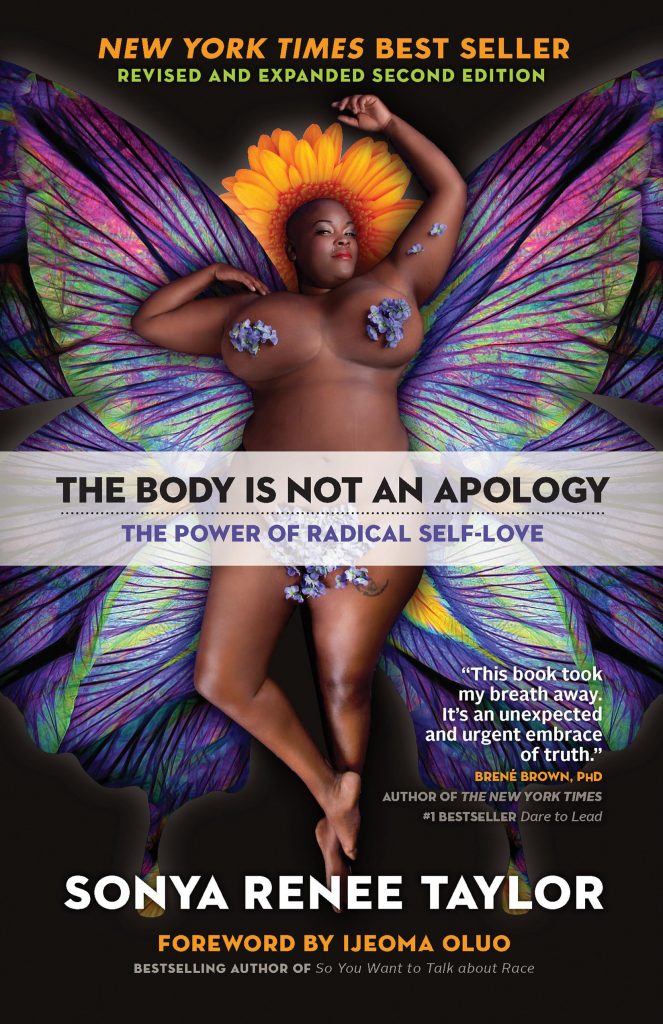Ever stumbled upon a book that nudges you to re-evaluate your relationship with self-love and body empowerment? We’ve been delving into Sonya Renee Taylor’s “The Body Is Not an Apology, Second Edition,” and this work of radical thought is nothing short of transformative.
Diving into these pages, we were struck by the compelling mix of personal narrative and actionable insight. Taylor challenges readers to confront societal norms around bodies and self-worth. The seminal text isn’t just philosophy – it’s a call to arms for everyone to embrace their own bodies and, by extension, their true selves.
Readable and accessible, the book encompasses a blend of anecdotal evidence and a practical framework for understanding how we’ve been taught to feel about our bodies. While it’s packed with unapologetic truths, some may find the critical examination of deep-rooted biases challenging, yet it is in this challenge that the book finds its strength.
Bottom Line
“The Body Is Not an Apology” wakes you up to the ways we devalue ourselves. If you’re ready to step into a world of self-celebration and empowerment, this book is a can’t-miss.
Boost your journey towards radical self-love and acceptance.
Take the leap and get your copy on Amazon today!
Overview of The Body Is Not an Apology, Second Edition: The Power of Radical Self-Love
Having delved into “The Body Is Not an Apology”‘s second edition, we’re met with an enriching experience that highlights the importance of embracing oneself fully. This book’s core message revolves around the practice of radical self-love, and it’s clear why it resonates with so many. With a 4.7-star rating from over 3,000 readers, its impact is undeniable.
Sonya Renee Taylor challenges readers to reject society’s body-shaming dictates and to embrace a personal journey of self-acceptance. This text is not a shallow feel-good mantra; it’s a profound call to action for personal empowerment and societal change. Our walk through these pages felt like an intimate conversation, powerful and at times raw in its honesty.
Yes, this is a book that won’t automatically resonate with everyone from the first page – the approach might be too direct for some. However, it’s admirable how it handles complex issues with dexterity, managing to be both accessible and eye-opening. The second edition adds layers to the narrative, making the read refreshing even for those familiar with the original release. The additional insights and updated content make it a must-read for both newcomers and returning readers eager to revisit the principles of self-love and acceptance.
Key Features
Having spent time with “The Body Is Not an Apology”, we’ve gathered that it’s much more than a typical self-help book. It’s truly a transformative journey that fosters empowerment and encourages embracing oneself fully. Here, we’ll explore the key features that make this book a standout choice for anyone on the path to self-love and acceptance.
Exploration of Radical Self-Love
The core idea of “The Body Is Not an Apology” is its fierce approach to self-love. The book doesn’t just speak about general concepts of loving oneself; instead, it dives into the notion of radical self-love. Through our reading, we learned that this form of self-love is assertive and action-oriented, pushing us beyond our comfort zones. It’s a compelling call to dismantle the societal and internalized norms that often dictate how we should feel about our bodies.
Tangible Steps Towards Self-Acceptance
The author provides practical advice on moving towards self-acceptance. The testimonials from readers resonate with us, highlighting how the book and accompanying workbook offer impactful exercises. Through these activities, we’ve observed real changes in how to approach self-care and self-validation. The book doesn’t shy away from the effort required to achieve self-acceptance, and that honesty is grounding.
Impact on Mental Health
The influence of “The Body Is Not an Apology” on mental well-being is significant. We’ve come to understand how the negative perceptions we harbor about ourselves can be detrimental to our mental health. This book serves as a tool to combat the incessant mental battles tied to body image. It’s not just a feel-good read; it’s a mirror that has made us confront our deep-seated insecurities and replace them with affirmations of self-worth.
Inclusivity and Diversity
Diversity and inclusivity are at the heart of this book. It doesn’t just speak to a single demographic but expands its message to all bodies and backgrounds. The author’s emphasis on inclusivity is evident from the narratives shared by readers coming from various cultures and perspectives. This makes the book’s lessons universally applicable and particularly powerful, as it promotes a message of unity in self-love without discrimination.
Through our exploration, we’ve seen the good—the book’s pivotal role in carving out a space for self-love in readers’ lives. Yet, it’s also important to note that some have criticized its approach to health and body size, which might not align with everyone’s beliefs about well-being. Nonetheless, “The Body Is Not an Apology” stands as a beacon of empowerment and a testament to the strength found in self-acceptance.
Pros
Having immersed ourselves in the transformative pages of “The Body Is Not an Apology,” we’ve surfaced with a profound appreciation for its message of radical self-love. But the book is far more than just uplifting sentiment—let’s break down what truly sets it apart.
Empowering Content
“The Body Is Not an Apology” offers an unflinching look at society’s rigid beauty standards and the liberation found in self-acceptance. We discovered that the prose doesn’t just dwell on problems but also provides actionable solutions and thoughtful prompts. Reading this work felt like a journey of empowerment, awakening a new perspective on our bodies and the myriad ways we relate to them. It’s as though the author has held up a mirror to the societal structures we often take for granted, urging us to reassess them with fresh eyes.
- Insightful: Each chapter unpacks layers of social conditioning and encourages readers to rethink preconceived notions of beauty and worth.
- Inspirational: Real-life examples and narratives serve not just as testimonials but powerful beacons of hope and transformation.
- Practical: The accompanying workbook is a game-changer, bridging the gap between ideas and real-world application.
Accessible Writing Style
The prose’s accessible nature deserves a hat tip. Sans jargon, convoluted sentences, or academic gatekeeping, these pages invite readers from all walks of life into a crucial conversation. Here’s what stood out to us:
- Clarity: The language is straightforward and precise, making complex issues understandable without oversimplification.
- Engagement: Paced perfectly to keep us engaged without overwhelming, the chapters flow seamlessly, each section inviting introspection.
Through its content and style, this book manages to be an agent of change. Not only does it cultivate awareness about the various shapes discrimination can take, but it also arms us with the tools to champion self-love and celebrate diversity. It’s contrary to what many of us have internalized over the years, and that’s a good thing. The lessons within, underscored by the author’s personal experiences, feel like conversations we’ve just had—warm, resonant, and filled with the kind of truth that sticks with you long after you’ve turned the final page.
Cons
Contrasting Views on Health Implications
Having spent some time with “The Body Is Not an Apology”, we’ve noticed a divide among readers regarding health perspectives. While many applaud the book’s message of inclusivity and its challenge to conventional beauty standards, a point of contention arises with the treatment of health-related issues.
- Health and Weight: A primary concern expressed is the book’s approach to obesity and its health implications. Some readers feel that the author downplays the seriousness of being overweight, which is a significant health risk factor. The encouragement of body positivity is positive, but for some, the discussion regarding the health consequences of obesity feels insufficiently addressed.
- Understanding the Balance: We acknowledge the importance of fostering self-love without shame. However, the challenge lies in striking a balance between self-acceptance and the promotion of a healthy lifestyle. It’s important to consider nuanced discussions that acknowledge the complexities of health while simultaneously advocating for body positivity.
- Impact on Lifestyle Choices: The inspirational tone of the book motivates many to embrace activities that connect them with their bodies, like dancing. Yet, for us, it’s also critical to keep in mind that radical self-love and lifestyle changes should go hand in hand with an understanding of health sciences.
The discussions around these nuances are essential, and while readers find the content enlightening, some caution that health implications require a more layered approach. We appreciate the book’s revolutionary stance, though we recognize the necessity for a dialogue that encompasses both self-acceptance and health awareness.
Exploration of Social Constructs
In the realm of understanding and acceptance, “The Body Is Not an Apology” serves as a profound guide. Our journey through its pages revealed that the book expertly navigates the web of societal norms that often dictate how we perceive our bodies. It pushes us to confront these constructs with the power of radical self-love. At times, we found the content quite challenging; it demanded that we question deeply ingrained beliefs and the long-standing conditioning of societal messages.
We appreciated how the book did not shy away from difficult conversations, like the intersection of body positivity with health concerns. Indeed, some of us were skeptical of its stance on obesity, yet were intrigued by its call for inclusivity and the staunch opposition to body shaming. The author addresses these issues with clarity and without resorting to a sugarcoated narrative.
Reflecting upon our experience, it’s evident that the book inspired a shift within us. Several among us felt compelled to explore new activities, such as dance classes, to celebrate our bodies. It’s not an everyday read; the content often pauses you to think, to reflect deeply about how society’s endorsements affect our self-view.
Our consensus is that “The Body Is Not an Apology” is not just a book, but a movement to embrace. It boldly dissects and reconstructs the psychology around self-esteem and body acceptance, offering fresh, systemic perspectives that resonate with a diverse audience. Considering these observations, this book has earned a space on our shelves as a catalyst for personal transformation.
Customer Reviews
We’ve felt truly embraced by the book’s powerful message of self-love and acceptance. It’s not just a book; it’s a journey that guides readers toward a deeper understanding and appreciation of themselves. We’ve noticed that many readers, including ourselves, have found the content to be thought-provoking and transformative, enforcing consistent pauses for reflection amid the pages.
Fellow readers have pointed out that while the book’s ideas are commendable and much needed in our society, a few expressed concerns that some topics, particularly concerning health, might have been downplayed. These critical insights illustrate that while the book is largely celebrated, it also triggers important discussions on body positivity and health consciousness.
We were particularly touched by the way many users have incorporated the teachings into their lives, often mentioning how it encouraged activities that foster body positivity, like dancing. The companion journal seems to complement the reading experience, as many of us have eagerly started using it as well.
Some felt challenged by the book’s confrontational approach to societal norms, viewing this as an opportunity for profound personal growth. Despite the occasional criticism, it is evident that “The Body Is Not an Apology” has had a positive impact, resonating with a diverse range of readers and helping us to navigate the complex terrain of self-acceptance.
Conclusion
Having spent time with “The Body Is Not an Apology” by Sonya Renee Taylor, we are struck by its power as a catalyst for personal transformation. It’s more than just a book; it’s an invitation to embark on a journey towards radical self-love. While we acknowledge that some readers may find challenges in confronting deep-seated beliefs, we appreciate how it nudges us out of our comfort zones with its thought-provoking content.
The writing is engaging and each chapter serves as a stepping-stone to greater self-acceptance. We’ve observed its positive impact even in brief therapy sessions and admire its inclusivity which extends the conversation beyond conventional norms. Although there’s a point of contention regarding the author’s stance on obesity’s health implications, the overall message remains compelling.
Some of us have been inspired to take practical steps, like starting dance classes, to celebrate our bodies. We recommend this book to anyone ready to disrupt negative self-talk and embrace a fuller appreciation of themselves. Its companion journal also comes highly recommended for those seeking to deep-dive into the exercises and integrate the lessons into daily life.
Related books:
- You Are a Badass Review: Worth the Hype?



